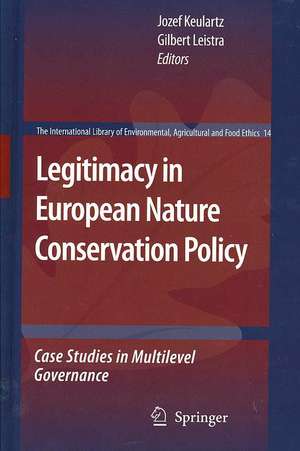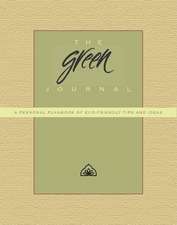Legitimacy in European Nature Conservation Policy: Case Studies in Multilevel Governance: The International Library of Environmental, Agricultural and Food Ethics, cartea 14
Editat de Jozef Keulartz, Gilbert Leistraen Limba Engleză Hardback – 28 dec 2007
In this volume, nine case studies are presented, seven case studies of protected areas in different countries (Belgium, Germany, Poland, Spain, Finland, France and the UK), and two case studies of protected species (the geese in the Netherlands, and the great Cormorant in Denmark and Italy). These case studies are followed by extensive comments. The volume opens with an introductory chapter on the problematic production of legitimacy in current European nature policy. It concludes with a chapter that situates the case studies within the wider EU environmental policy and political context.
| Toate formatele și edițiile | Preț | Express |
|---|---|---|
| Paperback (1) | 640.55 lei 6-8 săpt. | |
| SPRINGER NETHERLANDS – 30 noi 2010 | 640.55 lei 6-8 săpt. | |
| Hardback (1) | 646.75 lei 6-8 săpt. | |
| SPRINGER NETHERLANDS – 28 dec 2007 | 646.75 lei 6-8 săpt. |
Din seria The International Library of Environmental, Agricultural and Food Ethics
- 15%
 Preț: 707.96 lei
Preț: 707.96 lei -
 Preț: 451.76 lei
Preț: 451.76 lei - 18%
 Preț: 731.10 lei
Preț: 731.10 lei - 18%
 Preț: 744.53 lei
Preț: 744.53 lei - 18%
 Preț: 899.87 lei
Preț: 899.87 lei - 18%
 Preț: 1831.27 lei
Preț: 1831.27 lei - 15%
 Preț: 644.82 lei
Preț: 644.82 lei - 15%
 Preț: 643.16 lei
Preț: 643.16 lei - 18%
 Preț: 947.04 lei
Preț: 947.04 lei - 18%
 Preț: 953.20 lei
Preț: 953.20 lei - 15%
 Preț: 646.62 lei
Preț: 646.62 lei - 18%
 Preț: 1116.40 lei
Preț: 1116.40 lei - 15%
 Preț: 643.99 lei
Preț: 643.99 lei - 18%
 Preț: 953.65 lei
Preț: 953.65 lei - 15%
 Preț: 645.28 lei
Preț: 645.28 lei - 15%
 Preț: 637.28 lei
Preț: 637.28 lei - 18%
 Preț: 786.66 lei
Preț: 786.66 lei - 15%
 Preț: 644.30 lei
Preț: 644.30 lei -
 Preț: 398.74 lei
Preț: 398.74 lei - 18%
 Preț: 902.69 lei
Preț: 902.69 lei - 24%
 Preț: 697.64 lei
Preț: 697.64 lei -
 Preț: 388.52 lei
Preț: 388.52 lei - 20%
 Preț: 570.97 lei
Preț: 570.97 lei - 18%
 Preț: 784.61 lei
Preț: 784.61 lei - 15%
 Preț: 527.79 lei
Preț: 527.79 lei - 24%
 Preț: 635.52 lei
Preț: 635.52 lei - 15%
 Preț: 647.08 lei
Preț: 647.08 lei
Preț: 646.75 lei
Preț vechi: 760.88 lei
-15% Nou
Puncte Express: 970
Preț estimativ în valută:
123.75€ • 134.85$ • 104.28£
123.75€ • 134.85$ • 104.28£
Carte tipărită la comandă
Livrare economică 23 aprilie-07 mai
Preluare comenzi: 021 569.72.76
Specificații
ISBN-13: 9781402065095
ISBN-10: 1402065094
Pagini: 300
Ilustrații: XVI, 284 p.
Dimensiuni: 156 x 235 x 29 mm
Greutate: 0.59 kg
Ediția:2008
Editura: SPRINGER NETHERLANDS
Colecția Springer
Seria The International Library of Environmental, Agricultural and Food Ethics
Locul publicării:Dordrecht, Netherlands
ISBN-10: 1402065094
Pagini: 300
Ilustrații: XVI, 284 p.
Dimensiuni: 156 x 235 x 29 mm
Greutate: 0.59 kg
Ediția:2008
Editura: SPRINGER NETHERLANDS
Colecția Springer
Seria The International Library of Environmental, Agricultural and Food Ethics
Locul publicării:Dordrecht, Netherlands
Public țintă
Professional/practitionerCuprins
European Nature Conservation Policy Making.- Protected Species.- Wintering Geese in the Netherlands.- Vindicating Arrogant Ecologists.- Legitimacy of Species Management.- Animal Governance: The Cormorant Case.- Protected Areas.- Legitimacy Problems in Spanish Nature Policy.- How to Deal with Legitimacy in Nature Conservation Policy?.- Resistance to Top-Down Conservation Policy and the Search for New Participatory Models.- Visions and Scales of Nature and Society in Nature Management.- Creation of a Bottom–Up Nature Conservation Policy in Poland.- Nature Conservation in Poland and the Netherlands.- Conservation in Context: A View from below.- Towards Governance and Procedural Legitimacy?.- Countries.- Endangered Legitimacy.- Nature Policy in Flanders.- Between European Injunction and Local Consultation.- The Local Implementation of Nature Policy.- Legitimacy of Biodiversity Policies in a Multi-level Setting.- Are Conflicts of Nature Distributive Conflicts?.- Conclusions.- European Union Environmental Policy and Natura 2000.
Recenzii
From the reviews:
“Numerous expert contributors–25 in total–examine issues of governance and legitimacy via exploring various European case studies. … the text to be straightforward, the discussions of policy issues to be informative, and the examinations of legitimacy production to be revealing. … accessible to novices of EU nature conservation policy as well as to experts in the field. … With its breadth of information, depth of discussion, and clarity of presentation, this text is accessible to both novices and experts of EU nature conservation policy.” (Sarah Beach, Journal of Agricultural and Environmental Ethics, Vol. 24, 2011)
“Numerous expert contributors–25 in total–examine issues of governance and legitimacy via exploring various European case studies. … the text to be straightforward, the discussions of policy issues to be informative, and the examinations of legitimacy production to be revealing. … accessible to novices of EU nature conservation policy as well as to experts in the field. … With its breadth of information, depth of discussion, and clarity of presentation, this text is accessible to both novices and experts of EU nature conservation policy.” (Sarah Beach, Journal of Agricultural and Environmental Ethics, Vol. 24, 2011)
Textul de pe ultima copertă
This volume focuses on the issue of legitimacy in the context of European nature conservation policy. It provides insights in the way in which democratic legitimacy is being ‘produced’ at different levels of governance. Building forth upon recent developments in democracy theory that have identified multiple forms of legitimacy, the volume observes a EU-wide shift from output legitimacy to input and throughput legitimacy. Top down policy making is increasingly meeting
local resistance. As a result, the importance for policy makers of enhancing the democratic legitimacy of their policy plans has increased. The popularity of deliberative decision-making procedures can be seen as a procedural answer to this state of affairs.
For this volume scholars from within the EU were invited to reflect upon the question whether similar developments are taking place in the context with which they are most familiar. Do they perceive a delegitimation of top down policy making and hence an increasing emphasis on procedural legitimacy in processes of nature conservation policy implementation? Which model of democratic decision-making is most helpful to solve the issue of legitimacy in the field of nature conservation policy? How important are national traditions and institutions? What are the tradeoffs between the different types of legitimacy?
Nine case studies are presented: two case studies on protected species (geese in the Netherlands, and the great cormorant in Denmark, France and Italy), four case studies that zoom in on specific protected areas (in Spain, Finland, Poland and the UK), and three case studies with a focus on the implementation of Natura 2000 at the country level (Belgium, France and Germany). These case studies are followed by extensive comments.
local resistance. As a result, the importance for policy makers of enhancing the democratic legitimacy of their policy plans has increased. The popularity of deliberative decision-making procedures can be seen as a procedural answer to this state of affairs.
For this volume scholars from within the EU were invited to reflect upon the question whether similar developments are taking place in the context with which they are most familiar. Do they perceive a delegitimation of top down policy making and hence an increasing emphasis on procedural legitimacy in processes of nature conservation policy implementation? Which model of democratic decision-making is most helpful to solve the issue of legitimacy in the field of nature conservation policy? How important are national traditions and institutions? What are the tradeoffs between the different types of legitimacy?
Nine case studies are presented: two case studies on protected species (geese in the Netherlands, and the great cormorant in Denmark, France and Italy), four case studies that zoom in on specific protected areas (in Spain, Finland, Poland and the UK), and three case studies with a focus on the implementation of Natura 2000 at the country level (Belgium, France and Germany). These case studies are followed by extensive comments.
Caracteristici
Integrates knowledge on a major piece of European policy (nature conservation policy) in a reflexive and comprehensive manner Combines theories of governance with theories of legitimacy Brings together empirical case studies and critical commentaries











